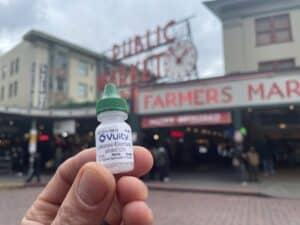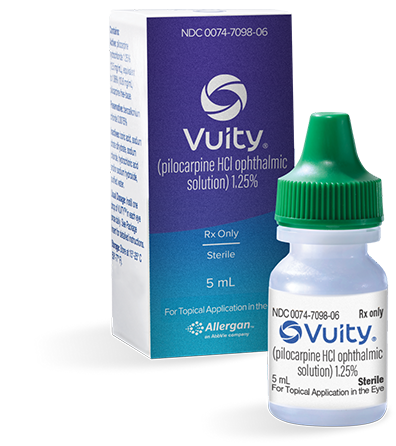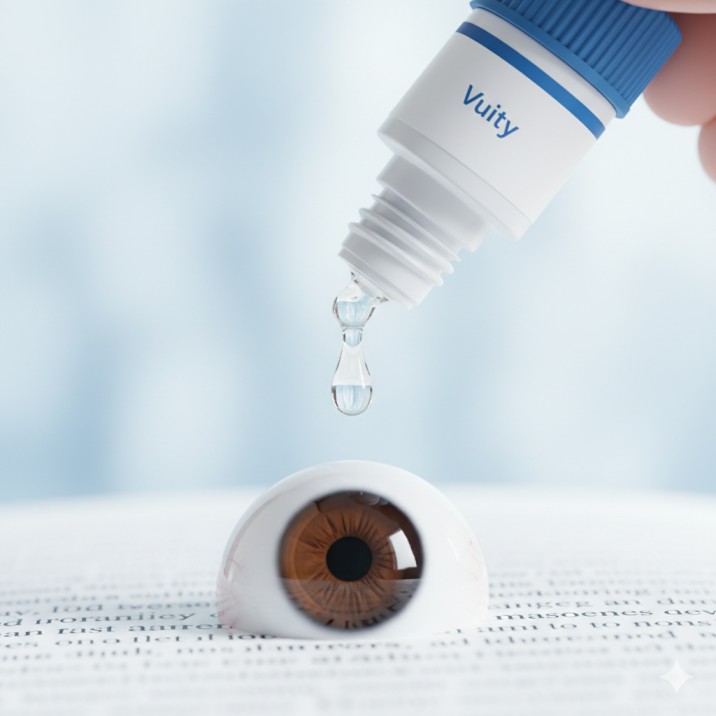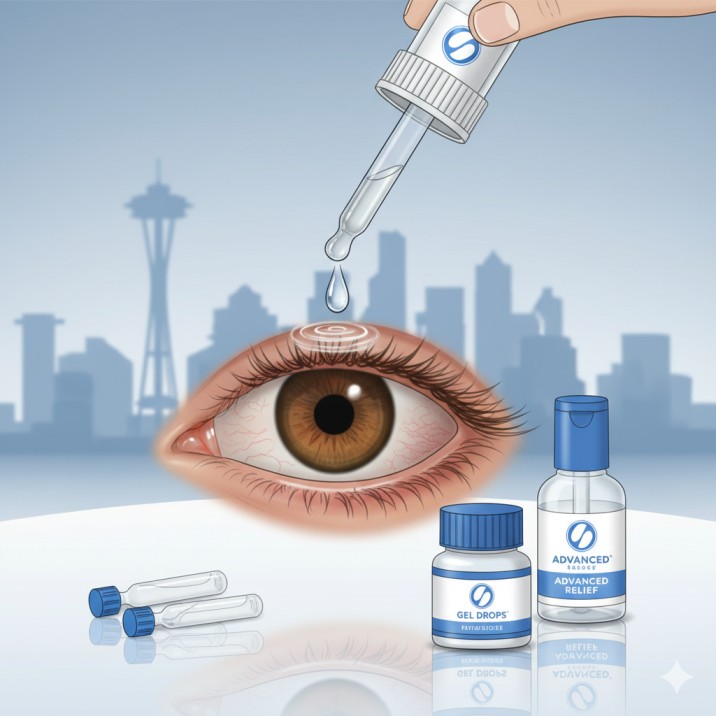Vuity Eye Drops: Seattle Optometrist’s Complete Review & Guide
Are you struggling with near vision after 40? Join the club.
Vuity are the FDA-approved eye drops for presbyopia. Read Dr. Mark J. Cannon’s review of how this exciting new product works and why you might (or might not) want to try it.
Presbyopia and Age-Related Vision Changes
 Presbyopia is the natural, age-driven loss of near vision that makes tasks like reading, phone use, or checking trail maps on hikes difficult. Unlike nearsightedness or astigmatism, presbyopia:
Presbyopia is the natural, age-driven loss of near vision that makes tasks like reading, phone use, or checking trail maps on hikes difficult. Unlike nearsightedness or astigmatism, presbyopia:
- Starts in early 40s, progresses through mid-60s
- Is universal (like gray hair) – not a disease
- Causes eye strain with close-up work
What Causes Presbyopia?
Your eyes’ lens stiffens with age due to:
- Proteins crystallizing, reducing flexibility
- Weakening muscles that shape the lens
This limits focus-shifting ability, when you’re performing close-up task.
Vuity Eye Drops: A Solution for Age-Related Near Vision?
How does Vuity help? The Pinhole Effect
Like a camera narrowing its aperture, Vuity gently constricts pupils to boost the depth of the field. By making your pupil considerably smaller, it increases your depth of field. Depth of field is a concept that describes how much of what you are seeing is in focus at once.
Vuity shrinks the diameter of your pupil, creating what is known as a pinhole effect. Having a smaller pupil means that more of what you are seeing is in focus. Thus, less near blur. For some people, this can translate into a lower dependence on glasses while you’re on the Vuity drops.
Dr.Mark’s Review
As a 47-year old eye doctor who started writing this blog without glasses and then took my first and only drop of Vuity in each eye today, I can report that it is helping me see my screen well. I’m still not wearing my glasses, but I see better up close and I’m not noticing any distance blur. Nor do I have any other potential listed side effects, but we are all different. Your experience may vary.
These eye drops do sting a bit. I, Mark J Cannon, an optometrist with sensitive eyes and some perspective on these things, describe the burning sensation as mild at first, then moderate and lasting 20-30 seconds after instillation. This level of discomfort is WAY better than any previous medicine containing this medicine’s active ingredient, Pilocarpine. As noted, I had some short-lived sting that was mild to moderate. Redness was not an issue for me personally.
Vuity Success Requires Precision
Ideal candidates need:
- +0.75 to +2.00 adds power in the prescription
- Perfectly corrected distance vision
- Vuity works best for the 40-55 age group
Why accuracy matters:
- Outdated Rxs reduce effectiveness by 60%
- Inaccurate glasses or contact lens Rxs will absolutely reduce your benefit
 Vuity Dosage Guide
Vuity Dosage Guide
- 1 drop per eye daily (FDA-approved)
- Works in 15 mins; lasts 4-6 hours
- Avoid second doses (increases side risks)
Vuity Side Effects
Understanding Vuity’s potential side effects ensures safe presbyopia treatment:
- Temporary stinging (20-30 sec) – milder than older pilocarpine drops
- Minimal redness
- Night caution
- Brow ache or eye strain sensations
- Discontinue if uncomfortable – effects fade by bedtime
Less Common Effects:
- Rare headaches
- Temporary distance vision reduction (prescription-dependent)
- Reduced focusing flexibility between near and far objects
- Ambient light dimming with overuse
Important Safety Note: Avoid driving if you experience vision changes. All effects typically resolve within 6 hours of application.
Vuity with Contact Lenses and Glasses: Seattle Optometrist Guidelines
Contact lens wearers can safely use Vuity by removing lenses before application and waiting 10 minutes before reinsertion. At our Seattle eye care practice, we recommend avoiding Vuity for patients with:
- Active iritis conditions
- High myopia with retinal risks
- Certain pre-existing eye conditions
The GEMINI-1 clinical trial, published in JAMA, provides comprehensive safety data for presbyopia patients considering this FDA-approved treatment.
Try Vuity Risk-Free in Seattle – No Commitment Needed
Patients can request complimentary Vuity samples (1.5 ml) at our clinic following a comprehensive eye exam, which includes a full safety check. You’ll have 2–3 weeks to test Vuity’s effects and see if it fits your lifestyle. Manufactured by AbbVie®, Vuity is fast-acting, and its effects fade quickly so you can stop anytime if you’re not satisfied.
At Cannon EyeCare, we empower your choices with:
- Vuity Consultation: Learn if it’s the right option for your vision needs.
- Advanced Alternatives:
- Multifocal contact lenses for hiking or kayaking.
- Custom glasses designed for Seattle’s dynamic light conditions.
Real-World Vuity Applications: Patient Case Studies
Most presbyopia patients still require reading glasses for extended tasks, but Vuity provides valuable flexibility for specific situations.
Case example: A 58-year old hyperopic surgeon uses Vuity for social dining while maintaining progressive lenses for detailed work.
Dosage Safety Warning: Testing revealed that exceeding the recommended dosage causes increased brow aches and light sensitivity, creating safety risks for driving. Adhering to one drop daily minimizes side effects while maximizing presbyopia treatment benefits.
How to Get Vuity Eye Drops
Vuity requires a prescription following a comprehensive eye examination to ensure presbyopia treatment safety. Many eye care providers offer free samples after your initial consultation. Some patients may need dilated eye exams before starting treatment, particularly those with:
- High prescription requirements
- Pre-existing eye conditions
- Previous eye surgeries
Most patients receive same-day approval for presbyopia treatment after their eye exam.
Vuity Cost and Insurance Coverage
Vuity typically costs $80-90 per bottle and remains a self-pay medication since insurance classifies presbyopia as a vision condition rather than a medical necessity. However, patients can use HSA/FSA funds for this FDA-approved presbyopia treatment.
Cost-Effectiveness Tip: One bottle provides approximately 50 drops (25-day supply with daily use), making occasional use extend the bottle’s lifespan significantly. Consider presbyopia alternatives like multifocal contact lenses if cost becomes prohibitive.
Vuity Pricing Analysis and Value
Vuity prescription eye drops cost approximately $80-90 per 2.5ml bottle at most pharmacies. Each bottle contains roughly 50 drops, providing a 25-day supply with daily use.
Cost-Effectiveness Benefits:
- As-needed dosing extends bottle lifespan
- Flexible application for specific activities
- No daily medication commitment required
- Potential monthly savings compared to daily presbyopia treatments
This FDA-approved presbyopia medication offers superior cost-effectiveness for patients requiring occasional near vision enhancement rather than continuous correction.
Presbyopia is a universal part of aging, but that doesn’t mean you have to let it limit your active Seattle lifestyle. Vuity eye drops offer a convenient, FDA-approved solution for sharper near vision without reading glasses, making it easier to enjoy everything from Pike Place Market menus to Mount Rainier trail maps. While not perfect for everyone, Vuity’s flexibility, cost-effectiveness, and proven safety make it an appealing option for many 40+ adults navigating age-related near-vision changes.
Ready to see if Vuity is right for you?
Schedule a comprehensive presbyopia consultation at Cannon EyeCare in today. Our Seattle optometrists will provide personalized recommendations, precision measurements, and even free Vuity samples to help you test the results risk-free. Don’t let presbyopia blur your world—take control of your near vision now.
FAQs: Vuity Eye Drops for Presbyopia in Seattle
-
What is Vuity and how does it work for presbyopia?
Vuity is the first FDA-approved eye drop for presbyopia, a condition causing near-vision blur after 40. It uses pilocarpine to constrict pupils, creating a “pinhole effect” that enhances depth of field. Seattle optometrists note it’s ideal for tasks like reading menus at Pike Place Market or texting in low-light settings.
-
Who is the ideal candidate for Vuity in Seattle?
-
Where can I buy Vuity eye drops in Seattle?
-
Why might Vuity be better than reading glasses for active Seattleites?
-
How quickly does Vuity take effect and how long does it last?
-
Will Vuity cause side effects that affect night driving in Seattle?
-
Can I use Vuity with contact lenses?
-
What is the cost of Vuity in Seattle, and is it covered by insurance?
-
Are there alternatives to Vuity for presbyopia in Seattle?
-
How can I try Vuity risk-free in Seattle?
-
Who should not use Vuity eye drops?
-
Can I drive after using Vuity?
-
Are Vuity eye drops better than reading glasses?
-
How often can I use Vuity eye drops daily?
-
Do Vuity eye drops work for everyone with presbyopia?
-
What happens if I miss a dose of Vuity?
-
Can children use Vuity eye drops?



